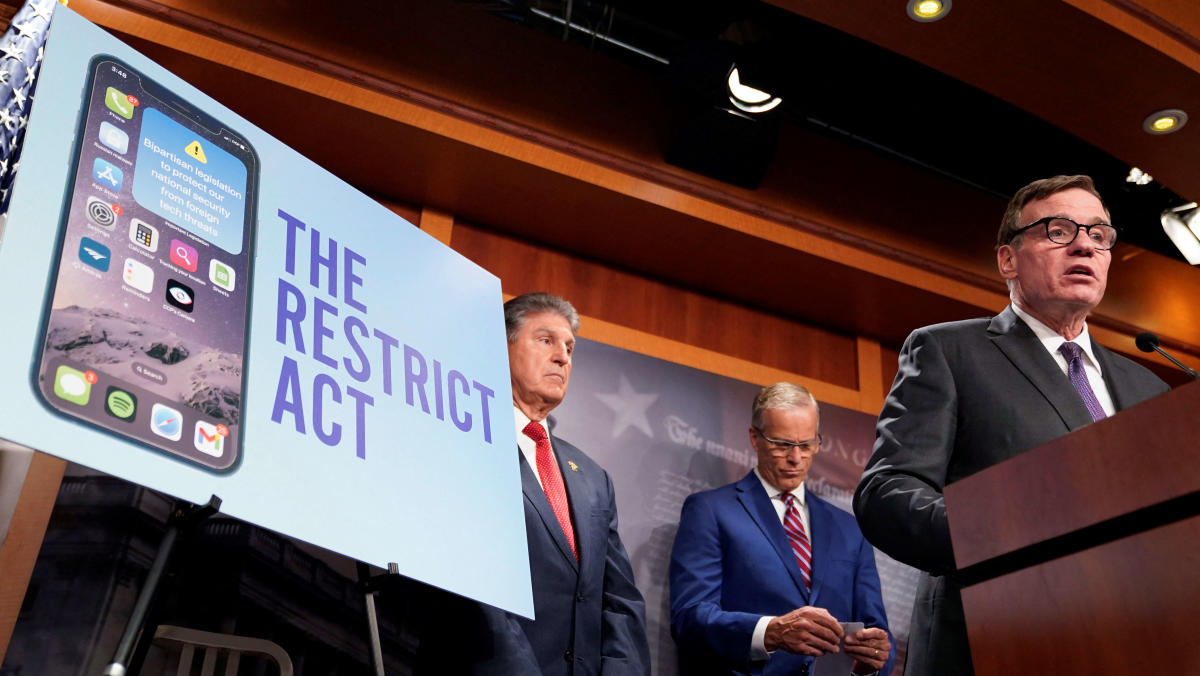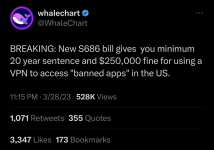You are using an out of date browser. It may not display this or other websites correctly.
You should upgrade or use an alternative browser.
You should upgrade or use an alternative browser.
Tik Tok Ban - Restrict Act
- Thread starter Goldhedge
- Start date
-
- Tags
- ban restrict restrict act tik tok
Welcome to the Precious Metals Bug Forums
Welcome to the PMBug forums - a watering hole for folks interested in gold, silver, precious metals, sound money, investing, market and economic news, central bank monetary policies, politics and more.
Why not register an account and join the discussions? When you register an account and log in, you may enjoy additional benefits including no Google ads, market data/charts, access to trade/barter with the community and much more. Registering an account is free - you have nothing to lose!
...
TikTok is just one app in a vast commercial surveillance ecosystem that has been allowed to grow unencumbered over the past two decades due to the lack of a U.S. privacy law. Even if the U.S. bans TikTok, millions of apps would continue to collect the most intimate details about us and profit off of them. The endless web of data brokers who buy and sell data would continue to exist, and foreign adversaries such as China could still obtain Americans’ personal data by simply purchasing it from data brokers on the open market. This is a data privacy crisis with serious national security implications and it is past time for Congress to act.
Don’t Just Ban One, Regulate Them All: Enact Comprehensive Privacy Legislation
Comprehensive privacy legislation such as the American Data Privacy and Protection Act (“ADPPA”) would go much farther to protect Americans’ personal data from bad foreign actors than a ban on one app. Here, we breakdown how the provisions of ADPPA would address the national security concerns being raised by lawmakers this week:
...
Simply forcing a ban or divestiture on TikTok in the U.S. without broader privacy rules will not solve the core national security concerns of data collection and exploitation by foreign governments nor will it do anything to change the data collection practices by the millions of other apps whose business practices pose similar national security issues. The lack of a U.S. privacy law means that the Chinese government can purchase a vast array of Americans’ personal data, either from the new owners of TikTok or from any one of the U.S. companies collecting and selling the same data points from users. These concerns would be more effectively addressed by the passage of a strong, comprehensive U.S. privacy law.

TikTok is Not the Only Problem
<p>TikTok is just one app in a vast commercial surveillance ecosystem that has been allowed to grow unencumbered over the past two decades due to the lack of a U.S. privacy law. Even if the U.S. bans TikTok, millions of apps would continue to collect the most intimate details about us and profit...
I still maintain that government devices should not allow installation/access to *any* social media.
Biden signed an executive order restricting the use of commercial spyware by the U.S. government:

Executive Order on Prohibition on Use by the United States Government of Commercial Spyware that Poses Risks to National Security | The White House
By the authority vested in me as President by the Constitution and the laws of the United States of America, it is hereby ordered as follows: Section 1. Policy. Technology is central to the future of our national security, economy, and democracy. The United States has fundamental...
The text for the Restrict Act can be found here:
Would the RESTRICT Act—a.k.a. the TikTok ban bill—criminalize the use of VPNs? That's the rumor floating around about the legislation, which was introduced in the Senate by Sen. Mark Warner (D–Va.) earlier this month. Warner's office has said his bill wouldn't do this… but its broad language leaves room for doubt. And the act is still insanely far-reaching and could have a huge range of deleterious effects, even if it doesn't criminalize people using a VPN to access TikTok.
...
Warner's "Restricting the Emergence of Security Threats that Risk Information and Communications Technology Act," or the RESTRICT Act, doesn't specifically mention TikTok or ByteDance. Rather, it would grant the U.S. secretary of commerce the broad power to "identify, deter, disrupt, prevent, prohibit, investigate, or otherwise mitigate … any risk arising from any covered transaction by any person, or with respect to any property" that the secretary determines to pose "an undue or unacceptable risk" in several different areas. These include federal elections, "information and communications technology products and services," and "critical infrastructure or digital economy," as well as "coercive or criminal activities by a foreign adversary that are designed to undermine democratic processes and institutions or steer policy and regulatory decisions in favor of the strategic objectives of a foreign adversary to the detriment of the national security of the United States."
The language describing who the RESTRICT ACT applies to is confusing at best. The commerce secretary would be authorized to take steps to address risks posed by "any covered transaction by any person," right? So what counts as a covered transaction? The bill states that this means "a transaction in which an entity described in subparagraph (B) has any interest." Entities described in subparagraph B are a "foreign adversary; an entity subject to the jurisdiction of, or organized under the laws of, a foreign adversary; and an entity owned, directed, or controlled by" either of these. Foreign adversaries can be "any foreign government or regime" that the secretary deems a national security threat.
...
More:

Could the RESTRICT Act Criminalize the Use of VPNs?
The act is insanely far-reaching and could have a huge range of deleterious effects, even if it doesn't criminalize people using a VPN to access TikTok.
- Messages
- 18,421
- Reaction score
- 11,086
- Points
- 288
The Restrict Act (TikTok Bill): Another Trojan Horse of Governmental Surveillance
The Restrict Act or TikTok Bill seems to be the latest trojan horse for governmental surveillance on Americans.By Wendi Strauch Mahoney
View original
If you yearn for more terrifying government intrusion into your life, then the “Restrict Act” is the bill for you. Clue number one, this bill is poorly conceived and exemplifies dangerous government overreach with its endorsement by Biden’s National Security Advisor, Jake Sullivan.


The Restrict Act (TikTok Bill): Another Trojan Horse of Governmental Surveillance - UncoverDC
The Restrict Act or TikTok Bill seems to be the latest trojan horse for governmental surveillance on Americans.
 www.uncoverdc.com
www.uncoverdc.com
- Messages
- 18,421
- Reaction score
- 11,086
- Points
- 288
OH SH*T, This Is Bad
As TikTok’s CEO is grilled in congress for allegedly spying on the US public it’s revealed that the same politicians who’ve publicly attacked the app also accept donations from TikTok executuves. This, while the CDC purchased private location data on over 55 million Americans to monitor lockdown compliance. You’ve almost got to admire the sheer nerve of them!15m
Viking
Yellow Jacket
Looks like it only applies to the federal government, or entities doing business with the federal government.
CATO weighs in (hopefully they are lobbying on the issue too):
More (long):
...
As we’ll explain, the proposal—at least as currently written—raises troubling and far‐reaching concerns for the First Amendment, international commerce, technology, privacy, and separation of powers.
...
As currently drafted, the RESTRICT Act likely runs afoul of the First Amendment, erodes Americans’ privacy protections, and would open the door to not only more misguided protectionism, but also government investigations, fines, and even imprisonment of Americans who engage in common online activities deemed too “risky” by the executive branch alone. Regardless of whether the act becomes law, that it quickly garnered 25 Senate co‐sponsors is a troubling indication that even the most egregiously bad legislation can attract a crowd these days if it’s sold as countering the “China threat.” And it shows that the risks to Americans’ wealth, safety, and security come not from China alone.
More (long):
- Messages
- 18,421
- Reaction score
- 11,086
- Points
- 288
That the Bill doesn't do what they said it will do (ala the Patriot Act?) tells us they have lost control of the narrative (communications) they heavily relied upon to control the masses. By way of this Bill they are attempting to wrest control back, but me thinks there are too many 'woke' (as in awakened) people and this isn't going to fly. They'll try again another way because they aren't going quietly.
Q said as much.
Q said as much.
From @pmbug 's link above: "Regardless of whether the act becomes law, that it quickly garnered 25 Senate co‐sponsors is a troubling indication "
This is just an indication that our so-called leaders in DC do not hold dear, the principle and ideals that the nation was Founded upon and that are enshrined in its Founding Documents.
If they did, they would not support such obviously un-American legislation.
This is just an indication that our so-called leaders in DC do not hold dear, the principle and ideals that the nation was Founded upon and that are enshrined in its Founding Documents.
If they did, they would not support such obviously un-American legislation.
EFF is opposing the bill:
More (long):

 www.eff.org
www.eff.org
...
We've explained our opposition to the RESTRICT Act and urged everyone who agrees to take action against it. But we've also been asked to address some of the concerns raised by others. We do that here in this post.
...
EFF opposes the bill, and encourages you to reach out to your representatives to ask them not to pass it. Our reasons for opposition are primarily that this bill is being used as a cudgel to protect data from foreign adversaries, but under our current data privacy laws, there are many domestic adversaries engaged in manipulative and invasive data collection as well. Separately, handing relatively unchecked power over to the executive branch to make determinations about what sort of information technologies and technology services are allowed to enter the U.S. is dangerous. If Congress is concerned about foreign powers collecting our data, it should focus on comprehensive consumer data privacy legislation that will have a real impact, and protect our data no matter what platform it’s on—TikTok, Facebook, Twitter, or anywhere else that profits from our private information. That’s why EFF supports such consumer data privacy legislation. Foreign adversaries won't be able to get our data from social media companies if the social media companies aren't allowed to collect, retain, and sell it in the first place.
...
More (long):

The Broad, Vague RESTRICT Act is a Dangerous Substitute for Comprehensive Data Privacy Legislation
The recently introduced RESTRICT Act (S. 686, Sen. Warner and Sen. Thune) rightfully is causing a lot of concern. This bill is being called a “TikTok ban,” but it’s more complicated than that. As we wrote in our initial review of the bill, the RESTRICT Act would authorize the executive branch to...
... Although the primary targets of this legislation are companies like Tik-Tok, the language of the bill could potentially be used to block or disrupt cryptocurrency transactions and, in extreme cases, block Americans’ access to open source tools or protocols like Bitcoin. ...

The RESTRICT Act creates blanket authority, with few checks, to ban just about anything linked to a ‘foreign adversary’
An overbroad attempt to ban crypto using these new powers would be open to a court challenge, but the law has worryingly narrow avenues for review
As well they should.EFF is opposing the bill:
To know whether or not a Bill in Congress is a pos, you just gotta ask one question.
Would Ron Paul join ranks and vote in favor of it?
If the answer is no he would not, then the Bill is a pos and should not be supported.
.....and I can all but guarantee that he would not be in favor of this abomination so many in DC support.
Afaik, RP never voted in favor of any Bill that violated the intent of the Constitution.
- Messages
- 34,774
- Reaction score
- 5,908
- Points
- 288
Montana's legislature has passed a statewide ban on TikTok
Lakshmi Varanasi
Fri, April 14, 2023 at 6:51 PM EDT·2 min read
- On Friday, Montana became the first US state to pass legislation banning TikTok within state lines.
- The bill bans TikTok on nearly all personal devices and also bars app stores from offering TikTok.
- The bill is pending a signature from Montana's governor, Greg Gianforte, but would go into effect in 2024.
On Friday, Montana legislators voted in favor of a bill to ban TikTok within state lines.
Montana's House of Representatives voted 54-43 in favor of the bill on Friday afternoon after the state Senate approved the bill back in March, according to Helena news station KTVH.
The bill is now pending approval from Montana's governor Greg Gianforte. If signed, it'll take effect starting January 2024.
Montana's legislature has passed a statewide ban on TikTok
Montana's legislature became the first US state to pass a bill to ban TikTok. The bill is waiting approval from Governor Gianforte.
- Messages
- 34,774
- Reaction score
- 5,908
- Points
- 288
House easily passes bill that could ban TikTok
The House passed a bill that could ban TikTok in a 352-65 vote Wednesday, putting the spotlight on the Senate on how to handle the controversial legislation that has support from President Biden.One lawmaker voted present.
More:

House easily passes bill that could ban TikTok
The House passed a bill that could ban TikTok in a 352-65 vote Wednesday, putting the spotlight on the Senate on how to handle the controversial legislation that has support from President Biden. O…
- Messages
- 34,774
- Reaction score
- 5,908
- Points
- 288
TikTok faces crucial court hearing that could decide fate in US
WASHINGTON, Sept 13 (Reuters) - TikTok and parent company ByteDance face a key court hearing on Monday in a legal battle seeking to block a law that could ban the app used by 170 million Americans as soon as Jan. 19.The U.S. Court of Appeals for the District of Columbia will hold oral arguments on the legal challenge, putting the fate of Chinese-owned TikTok in the middle of the final weeks of the 2024 presidential election.
Both Republican presidential candidate Donald Trump and Vice President Kamala Harris are active on TikTok seeking to court younger voters.
More:
- Messages
- 34,774
- Reaction score
- 5,908
- Points
- 288
Not about any ban.
According to a rich list produced by the Hurun Research Institute, Zhang Yiming, is now worth $49.3bn (£38bn) - 43% more than in 2023.
The 41 year old stepped down from his role in charge of the company in 2021, but is understood to own around 20% of the firm.
More:
https://www.msn.com/en-us/news/worl...S&cvid=98fdeea091d7469dbe89acc41664b848&ei=19
TikTok founder becomes China's richest man
The surging global popularity of TikTok has seen the co-founder of its parent company, ByteDance, become China's richest person.According to a rich list produced by the Hurun Research Institute, Zhang Yiming, is now worth $49.3bn (£38bn) - 43% more than in 2023.
The 41 year old stepped down from his role in charge of the company in 2021, but is understood to own around 20% of the firm.
More:
https://www.msn.com/en-us/news/worl...S&cvid=98fdeea091d7469dbe89acc41664b848&ei=19
Last edited by a moderator:
- Messages
- 557
- Reaction score
- 467
- Points
- 238
Is it because so much content is stupid? Nah, can't be. Somehow, so many people seem to like the content? I pause to think about those who might actually like the content. Are advertisers involved? That would make it even harder to understand.The REAL Reason the U.S. Is Banning TikTok (It's Not Who You Think...)
- Messages
- 34,774
- Reaction score
- 5,908
- Points
- 288
China considers selling TikTok U.S. operations to Musk, Bloomberg reports
The contingency plan is one of several options China is exploring as the U.S. Supreme Court determines whether to uphold a law that calls for China-based ByteDance to divest TikTok’s U.S. business by Jan. 19, the report said, citing anonymous sources.
More:
- The Chinese government is considering a plan for Elon Musk to acquire TikTok’s U.S. business, Bloomberg News reported Monday.
- The contingency plan is one of several options China is exploring as the U.S. Supreme Court determines whether to uphold a law that could effectively ban TikTok in the U.S., the report said.
- A TikTok spokesperson said in an email to CNBC, “We can’t be expected to comment on pure fiction.”
The contingency plan is one of several options China is exploring as the U.S. Supreme Court determines whether to uphold a law that calls for China-based ByteDance to divest TikTok’s U.S. business by Jan. 19, the report said, citing anonymous sources.
More:
- Messages
- 34,774
- Reaction score
- 5,908
- Points
- 288
TikTok ban: Here’s what to expect if the app is banned in the U.S. on Sunday
TikTok looks close to getting banned in the U.S. on Sunday.That’s because the Supreme Court is viewed as open to upholding a national-security law that will shut down the video-sharing app on that day if it continues to be controlled by its Chinese parent company, ByteDance Ltd.
More:
https://www.msn.com/en-us/money/oth...the-us-on-sunday/ar-BB1rougV?ocid=socialshare
China considers selling TikTok U.S. operations to Musk, Bloomberg reports
... citing anonymous sources. ...
FWIW:
...
Following Bloomberg's report citing anonymous sources, a TikTok spokesperson told BBC News the whole story about China considering to sell the video-sharing platform to Musk as "pure fiction."
"We can't be expected to comment on pure fiction," the spokesperson told the British media outlet.
...
TikTok Dismisses Bloomberg's Report Of Potential Sale To Musk As "Pure Fiction" | ZeroHedge
ZeroHedge - On a long enough timeline, the survival rate for everyone drops to zero
Trading one authoritarian cage for another isn't the answer. Maybe some day some decentralized medium like Nostr will lead the way.
- Messages
- 34,774
- Reaction score
- 5,908
- Points
- 288

Supreme Court upholds TikTok ban - SCOTUSblog
This article was updated on Jan. 17 at 12:45 p.m. The Supreme Court on Wednesday unanimously upheld a federal law that will require TikTok to shut down in the United States unless its Chinese parent company can sell off the U.S. company by Jan. 19. In an unsigned opinion, the justices acknowledge
 www.scotusblog.com
www.scotusblog.com
- Messages
- 34,774
- Reaction score
- 5,908
- Points
- 288
Donald Trump said he would 'most likely' give TikTok a 90-day reprieve from a potential ban after he takes office, as the app with 170 million American users buzzed with nervous anticipation ahead of a Sunday shutdown.
2:23
2:23


